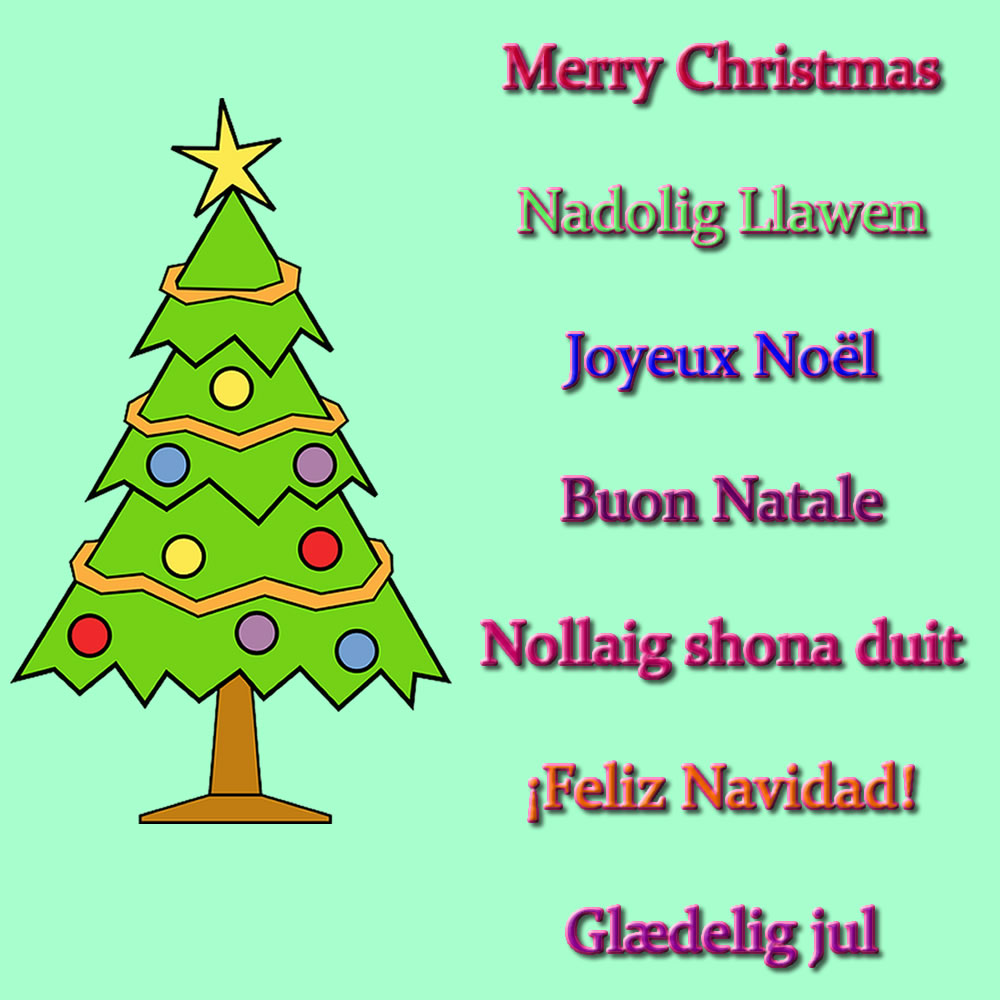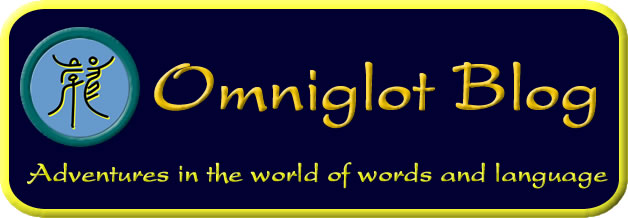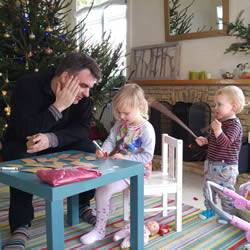Merry Chrimbo / Nadolig Llawen and all that sort of thing.

Yesterday I added two new language pages to Omniglot Nanggu (an Oceanic language spoken in the Solomon Islands) and Uneapa (an Oceanic language spoken in Papua New Guinea). Why do I mention this? Well, Uneapa happens to be the 2,000th language on Omniglot, and I thought that’s something to celebrate.

When I started Omniglot back in 1998, it was just a little site to promote a web design and translation business I tried to set up. I added information about languages I knew and could work with, and then starting adding details of alphabets and other writing systems, and the languages written with them.
Since then, the site has grown a bit and now has some 7,600 pages, with details of 345 writing sytems, 900+ constructed and adapted scripts, 2,000 languages, useful phrases in 362 languages, numbers in 1,081 languages, and much more.
Here are some significant moments from the past 26 years:
1998 – Omniglot begins
1999 – I started working as a web developer specialising in multilingual websites in Brighton (& Hove). I continued to work on Omniglot in my spare time while I was there.
2000 – Omniglot.com registered as a domain
2003 – Revenue from Omniglot starts to trickle in, mainly from commission on Amazon sales
2004 – visitor numbers to Omniglot reached 100,000 per month
2005 – I went to Donegal in the northwest of Ireland to study Irish language and songs for the first time. I went there for a week or two every summer until 2019.

2006 – Omniglot blog launched. My first post, after a welcome one, was about Language and memory. Since then, I have written 3,767 more posts, including this one.
2007 – I launched the Omniglot YouTube channel. My first video was a silly little conversation in French and English about flying monkeys and other strange things. Since then, I’ve posted another 239 videos.
2008 – I was made redundant from my job in Brighton and started working on Omniglot full-time, while doing a bit of freelance work for other websites. I also registered Omniglot as a limited company.
2008-2009 – I moved to Bangor in north Wales to do an MA in Linguistics at Bangor University. I’ve been here ever since.
2010 – I bought a house in Bangor after renting for a couple of years.
2011 – visitor numbers to Omniglot reached 1 million per month.
2012 – I started writing songs, inspired by a poetry writing workshop I went to in Bangor, and by a singing class I started attending in 2010. Since January 2019, I’ve written at least one new song every month. Here’s the first song I wrote:
2014 – I went to the Polyglot Gathering in Berlin, and to the Polyglot Conference in Novi Sad, Serbia. They were my first large polyglot events I’d attended, and I thoroughly enjoyed them. Since then, I’ve been to quite a few others in Europe and North America.
2015 – visitor numbers reached 2 million per month. I also started writing tunes this year. I think this is the first tune I wrote, played by me on the harp:
2016 – peak year so far in terms of visitor numbers and revenue from Omniglot. Thanks to my frugal habits, savings and income from my site, I was able to pay off my mortgage in full this year.
2017 – I started studying languages on Duolingo every day while recovering from a little ice skating accident involving a broken ankle, and have continued to do so ever since. My current streak is at 2,481 days today. So far I’ve studied Russian, Romanian, Czech, Swedish, Danish, Dutch, Esperanto, Spanish, Finnish, Japanese, Scottish Gaelic and Irish. I had some knowledge of most of them before, but Romanian, Danish and Finnish were completely new to me. I wouldn’t claim to speak any of them fluently or flawlessly, but I can at least have conversations in them.
2018 – I started Celtiadur, a blog where I explore connections between Celtic languages. My first post was about words for Big, Large & Great and related things. Since then, I have written 419 more posts, and have been working to improve the earlier posts, which tended to be quite basic.
This blog, under a different name, had previously been about my language learning efforts and travels, but I moved the old posts to my main Omniglot blog, decided to focus on Celtic languages instead.
I also started the Radio Omniglot blog and podcast. Episode 1 was about My Language Learning Adventures. Since then, I have written and recorded 381 more posts and podcasts.
2021 – I added the 1,500th language (Akawaio) to Omniglot.
2021 / 2022 – I had a home office / studio built in my garden. Since then, it’s been the place where I do most of my work, and make podcasts and other recordings.
2024 – I added the 2,000th language (Uneapa) to Omniglot.
Here are a few Christmas-related questions for you:
Are there any interesting customs or traditions you have or know about that you’d like to share?
A Multilingual Merry Christmas to all of you who celebrate it.
Do you make New Year’s resolutions?
If you have made any this year, are any of them related to languages?
I don’t tend to make New Year’s resolutions, and when I do, I rarely keep them. Sometimes I do manage to stick at things, at least for a while. Today, for example, my current streak on Duolingo reached 1,628 days. I’m learning Japanese and Spanish there, and keeping my Danish and Swedish ticking over. I’m also learning Dutch on Memrise, although I do miss occasional days. I don’t plan to learn any new languages for now, but who knows what could happen.
Meanwhile on Omniglot, I will carry on adding new material and improving the existing pages.
I’m taking a break from the monthly Radio Omniglot podcasts after reaching episode 50 in December, but will keep making the weekly Adventures in Etymology series and Omniglot News podcasts and videos. I also plan to add a new series – Celtic Routes – which will explore links within the Celtic language family, and between Celtic languages and other European languages. This will be based on my Celtiadur blog.
In other news, I’ve finally found a way to reduce some of the clutter of ads at the bottom of the pages on Omniglot.com using a PHP script that displays a different banner each time you refresh the page. Ideally there wouldn’t be any banners or other ads, but I do sort of need to make a living, and the ads help with that.
Back in April 2021 I wrote a post about various milestones I’d reached, including adding the 1,500th language to Omniglot. Well, yesterday I added the 1,600th language, which seems to me like something to celebrate.
So what’s been happening since April?
Well, as well as continuing to add new material to Omniglot every day, and improving the existing content, I’ve been making Adventures in Etymology blog posts / podcasts / videos every week and posting them on YouTube, Instagram and Tiktok. They tend to get the most views on Tiktok, and I’m hoping that at least some of the people who see them there will visit other parts of the Omniglot Linguistic Universe (OLU).
In July I started making Omniglot News blog posts and podcasts which summarise all the lastest developments on Omniglot. They appear on Sundays on the Radio Omniglot site and on the Omniglot News page.
Lockdown restrictions have eased here in Wales, and we can now go to pubs, restaurants and cafés, and to concerts and other events. I go to a Welsh folk music session every other Tuesday where we speak and sing mainly in Welsh, and play Welsh tunes. There are usually people from many countries there, so I get chances to speak other languages as well. I’ve started going to a Welsh conversation group on Wednesday nights, and I regularly have opportunities to speak French and Mandarin, and often write emails in Dutch. So I’m able to practise using some of my languages.
I’ve been to a few concerts recently, include a great one this week featuring the Washboard Resonators:
In other news, the studio that’s being built in my garden is coming together. The roof should be finished in the next few days, and then they can start working other parts. I’m looking forward to using it to make recordings and videos and practise my music and singing. Hopefully the acoustics will be very good inside.
An interesting expression that came up in my Dutch lessons recently is bakje troost [ˈbɑ.kjə troːst], which is slang for a cup of coffee, and a diminutive of bak troost. It could be translated literally as a “little cup of comfort” or a “little cup of solace”. It is also known as bakkie troost [source].
Here are some examples of how it’s used (from Reverso):
Bak means a bin, box, crate, tray or tub; a cup or mug; a jail, slammer or prison (slang), or a car. It comes from the French word bac (ferry, vat), from the Old French bas/bac (flat boat), possibly from the Vulgar Latin *baccu (container), from the Latin bacar (kind of wine glass). Or from a Celtic or Germanic word [source].
Some related words include:
Troost means comfort or consolation. It comes from the Middle Dutch troost, from the Old Dutch trōst, from the Proto-Germanic *traustą (shelter, help, aid, trust, confidence, alliance), from *traustaz (firm, strong), from thge Proto-Indo-European *deru-/*drew-/*drū- (to be firm, hard, solid, tree) [source].
The English words trust and tryst come from the same Germanic root, as do the German word Trost (consolation), the Swedish word tröst (comfort, consolation, dummy / pacifier), and related words in other languages [source].
This week some of the lockdown restrictions were lifted here in Wales, and cafés are open again, at least for takeaways. Yesterday I saw a long queue of people outside a café, probably waiting for their bakjes troost.
In the beforetimes I did go to cafés now and then for a cup of hot chocolate or herbal/fruit tea, maybe a pastry, and a change of scenery. This is something I miss a bit, but as I don’t drink coffee and rarely drink tea, I have no craving for caffeine, and won’t be queueing outside any cafés.
Are you missing cafés and coffee?

I spent Christmas at my brother’s house and had a nice time. It was interesting to see how the language skills of my niece (4) and my nephew (1) are developing.
My niece speaks a lot, mainly in English, and sometimes in Russian (her mum is Russian), and is learning to read and write in English. She can recognise the letters, and with help can read and write words. When she writes some letters are back-to-front or otherwise not quite right. She hasn’t started learning to read and write Russian yet, I don’t think.
My nephew is at the one-word stage. He can say quite a few individual words in English, and sometimes puts them together into short sentences. He also understands Russian, but I haven’t heard say any words in Russian.
Yesterday I went to see the ankle specialist at the local hospital,. He said that my ankle has healed well and just needs a bit of physiotherapy. I can start to wean myself off the orthopedic boot, using it less and less each day, and crutches as well. I didn’t wear the boot yesterday afternoon, and tried to get around a bit without the crutches. This worked okay, but when I went out last night to a gig, I wore the boot and took the crutches.
Today I went back to the hospital for some physiotherapy, without the boot, but with the crutches. The physiotherapist gave me some exercises to do, and said that I should try to move my ankle as much as possible. Within a few weeks I probably won’t need to crutches anymore, and in a few months my ankle should be back to normal. I’ll do all the exercises dilligently, and devise others as well, as I want to be fully mobile as soon as possible.
The physiotherapist suggested that I sit with my ankle raised for 20 minutes each hour. I plan to use this time to study languages, practise music, or read. At the moment I’m studying Russian, Swedish and Romanian, mainly on Duolinguo, while keeping my other languages, especially the Celtic ones, ticking over.
The word physiotherapy comes from physio, from Ancient Greek φύσις (phúsis – nature) and therapy, from New Latin therapia (therapy), from Ancient Greek θεραπεία (therapeía – service, medical treatment), from θεραπεύω (therapeúō – I serve, treat medically).
Six weeks ago today I had a slight mishap while ice skating in London, and managed to dislocate and fracture my ankle – both the tibia (shin bone) and fibula (calf bone).
The word tibia comes from the Latin tībia (shin bone, leg). It originally referred to a stalk, or reed pipe, and came to mean shin bone as flutes were originally made with shin bones. It is possibly connected to the Ancient Greek word σίφων (síphōn – siphon, tube) [source].
The word fibula comes from the Latin fībula (clasp, buckle, brooch), from fī(gō) (to fasten), and -bula (a suffix denoting instrument, vessel, place, or person) [source].
My bones should be healed by now – it usually takes about six weeks. I went to the local hospital a few weeks ago for a check-up. They x-rayed my ankle, took off the plaster cast, gave me a special orthopedic boot. They said that my ankle is healing well. I’ll be going back there in just over a week. In the meantime, I’ve started to experiment with putting more weight on my injured leg, using just one crutch, or walking without the crutches. I can does this quite well, though still need the crutches for stairs and steps.
I’ve adapted as best I can to having reduced mobility. It’s frustrating not being able to walk four or five miles a day, as I usually do, but I hope to be able to do that again soon. Some things, like grocery shopping, are difficult, so I order stuff online and had it delivered. I’ve noticed that many places are not very accessible, and that simple things like doors can be tricky to manage on crutches, especially if they have strong springs.

Recently I’ve been making a lot of small improvements to Omniglot. An American gentleman from Michigan has very kindly been proofreading parts of my site, and sending me long lists of corrections and improvements. So far we’ve worked through the languages written with the Latin alphabet from A-J.
I’ve corrected errors, edited and improved language descriptions, re-done many alphabet charts, added links to the Excel spreadsheets I use to create the charts, and added sample texts and videos, if I can find them. The alphabet charts (and other images) scale to fit the size of the screen you’re using to view my site, and I try to make them legible even on small screens.
Many other people send me suggestions for corrections and improvements, and I welcome all your feedback. If you spot anything on Omniglot that needs correcting, changing or improving, do let me know.
By the way, the number of visitors to Omniglot has diminished somewhat recently. I don’t know why, but would be grateful if you could recommend to site to everyone you know who is interested in languages.